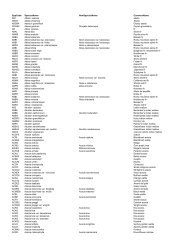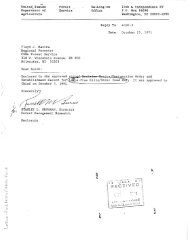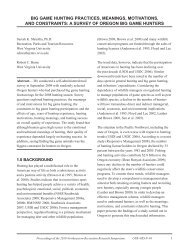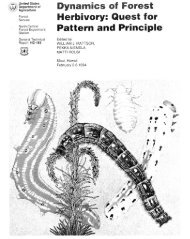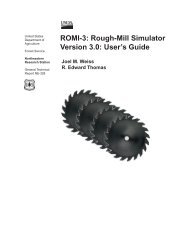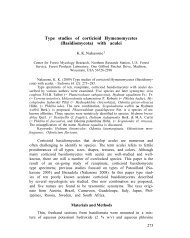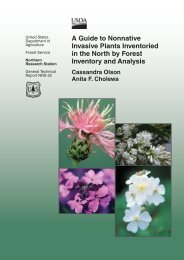Proceedings of the 2009 northeastern recreation research symposium
Proceedings of the 2009 northeastern recreation research symposium
Proceedings of the 2009 northeastern recreation research symposium
You also want an ePaper? Increase the reach of your titles
YUMPU automatically turns print PDFs into web optimized ePapers that Google loves.
ECONOMIC IMPACT AND MARKET ANALYSIS OF A SPECIAL EVENT:<br />
THE GREAT NEW ENGLAND AIR SHOW<br />
Rodney B. Warnick<br />
University <strong>of</strong> Massachusetts at Amherst<br />
David C. Bojanic<br />
University <strong>of</strong> Texas at San Antonio<br />
Atul Sheel<br />
University <strong>of</strong> Massachusetts at Amherst<br />
Apurv Ma<strong>the</strong>r and Deepak Ninan<br />
Graduate Students<br />
University <strong>of</strong> Massachusetts at Amherst<br />
Abstract.—We conducted a post-event evaluation for<br />
<strong>the</strong> Great New England Air Show to assess its general<br />
economic impact and to refi ne economic estimates<br />
where possible. In addition to <strong>the</strong> standard economic<br />
impact variables, we examined travel distance, purchase<br />
decision involvement, event satisfaction, and frequency<br />
<strong>of</strong> attendance. Graphic mapping <strong>of</strong> event visitors’ home<br />
ZIP codes using Google Earth provides a visual analysis<br />
<strong>of</strong> <strong>the</strong> markets for <strong>the</strong> event.<br />
1.0 INTRODUCTION<br />
In <strong>the</strong> last 15 years, special events throughout <strong>the</strong> United<br />
States have proliferated, drawing consumers from various<br />
local and regional markets and also seeking to create<br />
community cohesion and pride (Besculides et al.2002).<br />
Th ese events can create opportunities for exchange,<br />
revitalize traditions, enhance <strong>the</strong> quality <strong>of</strong> life for local<br />
residents, and improve <strong>the</strong> image <strong>of</strong> <strong>the</strong> host community<br />
(Clements et al. 1993, Weikert and Kerstetter 1996,<br />
Besculides et al. 2002).<br />
Special event sponsors usually aim to create a successful<br />
event using a concentrated and refi ned marketing<br />
eff ort and to demonstrate positive economic gains to<br />
<strong>the</strong> host community. While some activities or special<br />
events may be staged simply to generate goodwill<br />
toward <strong>the</strong> sponsoring agency, most must be fi nancially<br />
successful in order to continue. For example, nonpr<strong>of</strong>i t<br />
organizations may hold annual events to raise money<br />
for <strong>the</strong>ir operations and view <strong>the</strong>se events as major<br />
fundraisers; however, <strong>the</strong>y may also depend on a host<br />
community to cover or support a portion <strong>of</strong> <strong>the</strong> costs.<br />
With <strong>the</strong> increase in <strong>the</strong> number <strong>of</strong> special events comes<br />
increased competition among events. Organizers for each<br />
event need to identify and target <strong>the</strong>ir respective markets<br />
segments and market areas.<br />
1.1 Purpose <strong>of</strong> <strong>the</strong> Study<br />
Th e purpose <strong>of</strong> this study was tw<strong>of</strong>old: 1) to evaluate <strong>the</strong><br />
Great New England Air Show after <strong>the</strong> event to assess<br />
its general economic impact in <strong>the</strong> local region; and 2)<br />
to conduct a rudimentary market analysis <strong>of</strong> <strong>the</strong> event<br />
by examining attendees’ travel distances, attendance<br />
frequency, satisfaction with <strong>the</strong> event, and purchase<br />
decision involvement. O<strong>the</strong>r organizations can use this<br />
study’s methodology to examine special event market<br />
areas, to more fully understand <strong>the</strong> market behavior <strong>of</strong><br />
special event attendees, and to more accurately determine<br />
<strong>the</strong> economic signifi cance and impact <strong>of</strong> special events.<br />
2.0 LITERATURE REVIEW<br />
2.1 Economic Impacts <strong>of</strong> Special Events<br />
Special events generate economic activity and jobs for<br />
<strong>the</strong> host communities (Frey 1994, Dwyer et al. 2005).<br />
It is important for event organizers to have accurate<br />
information on <strong>the</strong> event’s past (if applicable) and<br />
projected economic impacts to garner community<br />
support and justify <strong>the</strong> allocation <strong>of</strong> resources for<br />
producing <strong>the</strong> event. Uysal and Gitelson (1994), Walo<br />
et al. (1996), Crompton and McKay (1997) Kim et al.<br />
(1998), Th rane (2002), Daniels and Norman (2003),and<br />
Koh and Jackson (2007) have examined <strong>the</strong> impact <strong>of</strong><br />
special events on local economies.<br />
However, travel <strong>research</strong>ers have debated about <strong>the</strong><br />
best method(s) for obtaining accurate economic impact<br />
fi gures and making reliable forecasts (Crompton et al.<br />
2001, Tyrell and Johnston 2001, Dwyer et al. 2005,<br />
Tyrrell and Ismail 2005, Crompton 2006, Stynes and<br />
White 2006). Th e August 2006 issue <strong>of</strong> <strong>the</strong> Journal <strong>of</strong><br />
Travel Research (Vol. 45, issue 1) focused on measuring<br />
<strong>Proceedings</strong> <strong>of</strong> <strong>the</strong> <strong>2009</strong> Nor<strong>the</strong>astern Recreation Research Symposium GTR-NRS-P-66<br />
247




